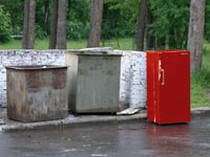Keeping old appliances leaves owners out in the cold

Holding on to an old refrigerator until it dies might seem economical, but most likely it costs consumers more money than it saves because older refrigerators can consume as much as twice the energy of newer models.
According to a study from the Center for Sustainable Systems at the University of Michigan, refrigerators that are 10 years old or older should be replaced to maximize investment and minimize consumption of fossil fuel resources.
Food refrigeration accounts for 14 percent of total electricity use in U.S. households, according to the Energy Information Administration. Despite the higher energy use and cost, the average lifetime of a typical household refrigerator is 14 years for a top mount type and 19 years for a one-door type, said Greg Keoleian, professor and co-director of CSS.
Following a more optimal replacement policy through 2020, current owners with models more than four years old would be expected to save between $50 and $200 over the 16-year span, Keoleian said. This figure factors in the purchase price of a new refrigerator.
"Household appliances generally require a great deal more energy to operate than they do to manufacture. At the same time, efficiency improvements are continually introduced into new models," Keoleian said. "What this tells us is that consumers are likely keeping the refrigerator longer than is optimal."
The refrigerator study used the same methodology as an earlier research project addressing automobile replacement. That study, called "Life cycle optimization of ownership costs and emissions reduction in U.S. vehicle retirement decisions," examined optimal vehicle replacement over a 36-year period, to minimize life-time economic and emissions burdens.
The results show that when replacing midsized cars with comparable models, the minimum private costs of vehicle ownership, energy use, and carbon dioxide emissions favor a long replacement period of 17-19 years. But, short replacement intervals of less than nine years minimize local air pollutants such as nitrogen oxides. However, when damage costs are used to estimate the cost of pollution to society, a replacement interval of 10 to 14 years is favored, the study said.
Consumers can find information about energy efficiency for appliances and calculate the savings of upgrading to more efficient appliances at www.Energystar.gov . Information on vehicle fuel economy and best in class vehicles is available at www.fueleconomy.gov/ .
Source: University of Michigan
















